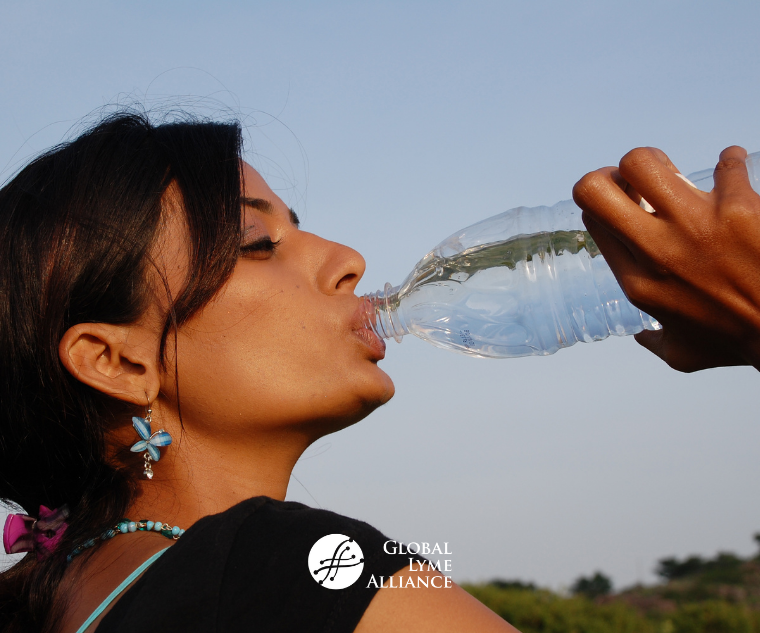
Did you know that Lyme disease can result in excessive thirst? Read about a woman's Lyme journey, how she persevered after doctors had brushed her off, and what she did to combat the thirst.
One of my earliest symptoms of tick-borne illness was excessive thirst. It was also one of the most prolonged, because it was so readily brushed off. A few weeks after I developed a blotchy red rash on my right forearm while working at a summer camp in Maine, I had a low blood sugar reaction. At the time, neither the camp nurse nor I thought to link the two events; it would be another eight years before I’d learn that both were the result of a tick bite that caused Lyme disease, babesiosis, ehrlichiosis and possibly bartonella.
That first low blood sugar reaction was followed by many others that summer. Along with them came increased thirst. I was tested for diabetes, which I did not have. When my symptoms did not fit into the most obvious box—low blood sugar and thirst are commons signs of diabetes—doctors did not look for other root causes. No one looked into possibilities like thyroid or adrenal imbalances. I was simply told to keep little snacks on hand, and to not drink so much water. “But I’m so thirsty,” I told doctors. “I don’t drink excessive amounts of water because I think I should. I drink it because I have to.” At times I was drinking upwards of twenty glasses of water a day and still craving more. If I drank any less, I got headaches and felt even more lethargic than I otherwise did with the flu-like fatigue that had developed after that summer. Despite the fluid intake, my urine was often concentrated. “Find something else to wet your mouth,” one doctor told me. “Try hard candies.” My mouth wasn’t dry; my body needed fluid, but no health professional seemed interested in finding out why.
To combat the continued hypoglycemia, I consumed a lot of sugar—not understanding that the subsequent spike in blood sugar would trigger another drop, creating a vicious cycle—which caused me to be even thirstier. But even when I eventually stabilized my blood sugar by following a lower glycemic diet, eating smaller meals throughout the day, and balancing carbohydrates with protein, my excessive thirst persisted.
By my hypoglycemia and on-and-off flu were part of a long list of growing symptoms, including migraine headaches, systemic hives, difficulty concentrating and other neurological impairments. Doctors treated each of them individually and topically—or told me they were all in my head. My water bottle became my security blanket. Friends teased me for carrying it everywhere, joking that I couldn’t even make a trip to the mailbox without it. When a Lyme Literate Medical Doctor (LLMD) finally put all of my symptoms together and discovered their root cause, he also found that my adrenals were shot and my thyroid was low. The excessive thirst finally had an explanation.
Once I started antibiotic treatment, I did still get very thirsty—both because of the infections I was fighting and the medications causing dry mouth—but over time, my need for water decreased. I still drink more than most people and never leave my water bottle at home. I also balance out regular water with electrolyte-infused water, to make sure that my sodium and potassium levels stay regulated. Reduced infection and increased thyroid and adrenal function have helped my body, and my extreme thirst, to normalize over time. Thirst can be a sign of any number of issues. Whatever the root cause, it means that something is off in the body. When your body gives you that kind of signal, don’t let doctors brush you off. No one knows your body better than you do. Listen to your symptoms, voice them to your practitioners, and don’t give up until you find an answer.
For more blogs, click here

Jennifer Crystal
Writer
Opinions expressed by contributors are their own. Jennifer Crystal is a writer and educator in Boston. Her work has appeared in local and national publications including Harvard Health Publishing and The Boston Globe. As a GLA columnist for over a decade, her work on GLA.org has received mention in publications such as The New Yorker, weatherchannel.com, CQ Researcher, and ProHealth.com. Jennifer is a patient advocate who has dealt with chronic illness, including Lyme and other tick-borne infections. Her memoir, One Tick Stopped the Clock, was published by Legacy Book Press in 2024. Ten percent of proceeds from the book will go to Global Lyme Alliance. Contact her via email below.




-2.jpg)

